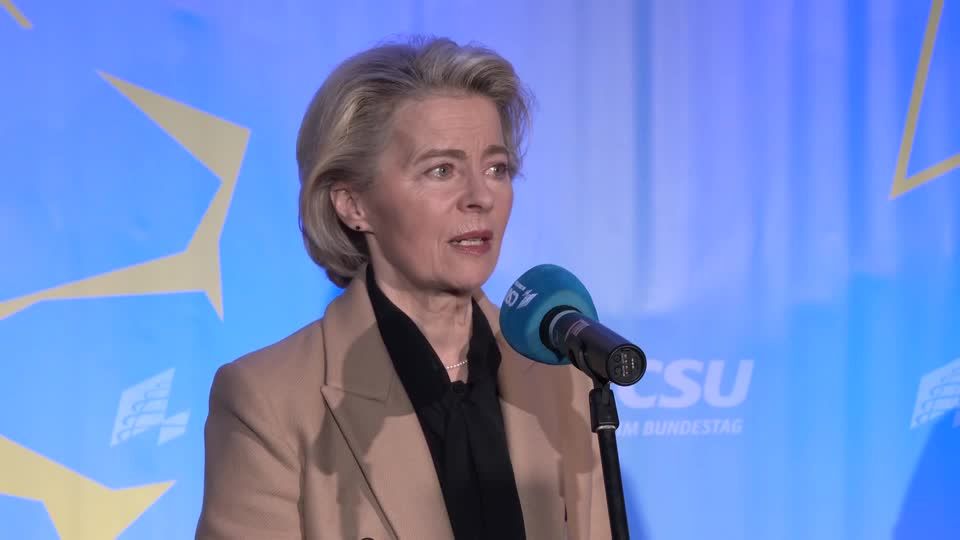Ursula von der Leyen has made it a second time. The CDU politician has the backing of the European Parliament for another five years at the head of the EU Commission. Also thanks to right-wing voices?
Ursula von der Leyen will remain president of the powerful EU Commission for another five years. In the European Parliament, the majority of MPs voted for the 65-year-old CDU politician, officially confirming her nomination by the heads of state and government of the EU countries. Von der Leyen received around 56 percent of the possible votes this time, significantly more than five years ago. Back then, only 51 percent of MPs eligible to vote voted for her.
Von der Leyen now received 401 of the possible 719 votes. She needed at least 360 votes.
The presidency of the EU Commission is by far the most important position in Brussels. Von der Leyen has around 32,000 employees reporting to her, who, among other things, make proposals for new EU laws and monitor compliance with the European treaties. In addition, the Commission President sits at the table as an EU representative at almost all major international summits such as the G7 or G20. For this reason, von der Leyen has been named the “most powerful woman in the world” several times by the US magazine “Forbes”.
Announcement of the end of combustion engines
Shortly before her election, von der Leyen outlined her plans for the next five years in her last candidacy speech to Parliament. She announced that she wanted to soften the EU ban on new combustion engine cars from 2035 by making exceptions for so-called e-fuels. She also wants to launch initiatives for cheaper housing, tripling the number of EU border guards and a European air defense system.
The former Federal Minister for Defence (2013-2019), Labour and Social Affairs (2009-2013) and for Family, Senior Citizens, Women and Youth (2005-2009) took office after the 2019 European elections. In Germany, von der Leyen’s party colleague Angela Merkel was still Chancellor at the time.

Von der Leyen: We Europeans decide who comes to Europe and under what circumstances
01:02 min
Election victory of centre-right coalition paved the way
The basis for Ursula von der Leyen’s renewed nomination was the victory of her European party family, the EPP, in the European elections. The centre-right alliance then agreed on a kind of informal coalition with the European social democrats and liberals and divided the newly vacant top posts between themselves.
The agreement also provides for the liberal Estonian Prime Minister Kaja Kallas to be appointed as EU High Representative for Foreign Affairs. The former Portuguese Prime Minister António Costa has already been elected President of the body of heads of state and government for an initial term of two and a half years.
The election of Ursula von der Leyen was a nail-biter until the very end
However, von der Leyen’s confirmation in Parliament was not 100 percent certain because there is no party discipline and the vote was by secret ballot. Von der Leyen has therefore held countless discussions with MPs in recent weeks to convince them of her support. It is always important for Parliament to reach as firm an agreement as possible on political goals with the Commission President before his election. This is because only the Commission can make legislative proposals at EU level.
Did members of Meloni’s party also vote for von der Leyen?
It was initially unclear how many MPs from right-wing parties voted for von der Leyen. Before the election, it had been speculated that her party family was also canvassing behind the scenes for votes from members of the Fratelli d’Italia (Brothers of Italy) of the right-wing Italian Prime Minister Giorgia Meloni. In return, von der Leyen could, for example, have offered to give the future Italian representative in the EU Commission an important area of responsibility. In addition, EPP MPs could have promised not to oppose Commissioner candidates from the parties that supported von der Leyen in the election. The EU countries’ candidates for the posts of Commissioner must be confirmed by Parliament. Ideally, the entire EU Commission, consisting of von der Leyen and 26 Commissioners, should run in November.
Note: This article has been updated to include additional information.
Source: Stern
I have been working in the news industry for over 6 years, first as a reporter and now as an editor. I have covered politics extensively, and my work has appeared in major newspapers and online news outlets around the world. In addition to my writing, I also contribute regularly to 24 Hours World.




